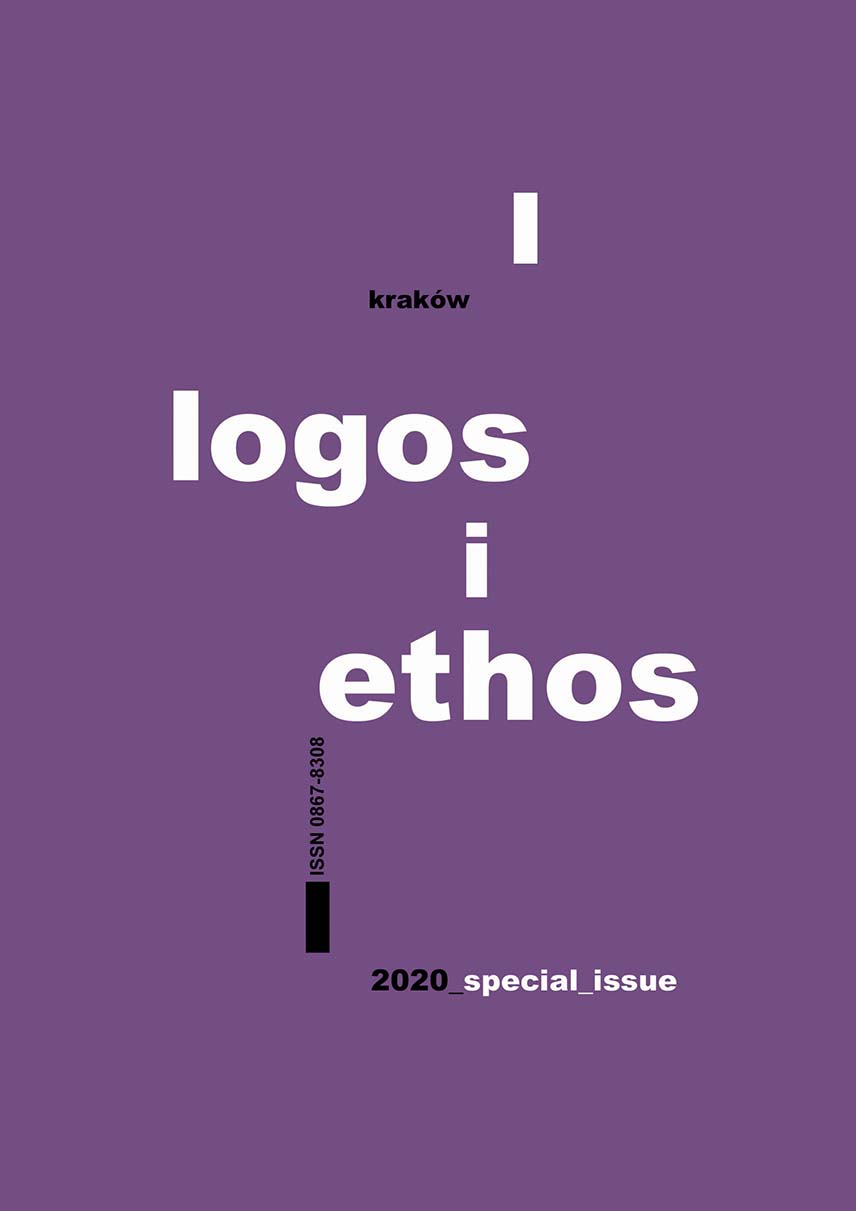Fragile subjectivity, or the controversy grounded on the Lévinasian and Ricœurian philosophies of man, and some of its implications for understanding mental health
DOI:
https://doi.org/10.15633/lie.3770Słowa kluczowe:
fragile subjectivity, Lé vinas, Ricœur, mental health, schizophreniaAbstrakt
The study aims to confront two concepts of fragile subjectivity: one by Emmanuel Lé vinas and the other by Paul Ricœur. However, this is not the purpose in itself. Actually, the first step consists on the pointing out the similarities and divergences that exist between both approaches in dealing with the open and labile trait of human identity. This step further serves to highlight the discussion points which, due to the tension generated by the underlined incompatibilities, stimulate thinking and the search for mediation. To illustrate the fertility of this controversy, it is transferred to the area of philosophy of psychiatry, where an attempt is made to apply both anthropological positions to a philosophical interpretation of the essence of the phenomenon of schizophrenia. This interpretation of the pathogenesis of the chosen phenomenon allows, in turn, for a cautious conclusion to be drawn as to the described controversy between Lé vinas and Ricœur.
Bibliografia
Dąbrowski K., Co to jest zdrowie psychiczne?, in: Zdrowie psychiczne, ed. K. Dąbrowski, Warszawa 1985, pp. 7–35.
Dosse F., Paul Ricœur. Les sens d’une vie (1913-2005), Paris 2008.
Drwięga M., Człowiek między dobrem a złem. Studia z etyki współczesnej, Kraków 2012.
Grzywacz R., Afektywność i język. Tożsamość człowieka w fenomenologii życia M. Henry oraz w fenomenologii hermeneutycznej P. Ricœura, in: W trosce o człowieka. Paradygmaty stare i nowe, ed. M. Szymczyk, R. Grzywacz, Kraków 2016, pp. 179–194.
Grzywacz R., Wybrane aspekty rozumienia natury ludzkiej w ujęciu Paula Ricœura, in: Oblicza natury ludzkiej. Studia i rozprawy, ed. P. Duchliński, G. Hołub, Kraków 2010, pp. 195–224.
Jakubowski J., Skończoność egzystencjalna. Studium nad filozofią Paula Ricœura, Bydgoszcz 2017.
Jarnuszkiewicz A. SJ, Od systemu do etyki. Krytyka rozumu dialogicznego, Kraków 2012.
Kapusta A., Szaleństwo i metoda. Granice rozumienia w filozofii i psychiatrii, Lublin 2010.
Kępiński A., Schizofrenia, Warszawa 1981.
Kowalska M., Wstęp. Dialektyka bycia sobą, in: P. Ricœur, O sobie samym jako innym, trans. B. Chełstowski, Warszawa 2018, pp. VII–XXXVII.
Lévinas E., Ricœur P., L’unicité humaine du pronom Je, in: Éthique et responsabilité. Paul Ricœur, ed. J.-Ch. Aeschlimann, Boudry-Neuchâtel 1994, pp. 35–37.
Lévinas E., Całość i nieskończoność. Esej o zewnętrzności, trans. M. Kowalska, Warszawa 1998.
Lévinas E., Inaczej niż być lub ponad istotą, trans. P. Mrówczyński, Warszawa 2000.
Lévinas E., Otherwise than Being or Beyond Essence, trans. A. Lingis, Dordrecht 1991.
Lévinas E., Totality and Infinity. An Essay on Exteriority, trans. A. Lingis, The Hague–Boston–London 1979.
Mukoid E. A., Filozofia zła: Nabert, Marcel, Ricœur, Kraków 1993.
Ricœur P., A l’école de la phénoménologie, Paris 2004.
Ricœur P., Autrement. Lecture d’Autrement qu’être ou au-delà de l’essence d’Emmanuel Lévinas, Paris 1997.
Ricœur P., Cierpienie nie jest bólem, in: P. Ricœur, Filozofia osoby, trans. M. Frankiewicz, Kraków 1992, pp. 55–63.
Ricœur P., Czas i opowieść, vol. 3: Czas opowiadany, trans. U. Zbrzeźniak, Kraków 2008.
Ricœur P., Drogi rozpoznania. Wykłady Instytutu Nauk o Człowieku w Wiedniu, trans. J. Margański, Kraków 2004. Ricœur P., Le Juste, vol. 2, Paris 2001.
Ricœur P., Miłość i sprawiedliwość, trans. M. Drwięga, Kraków 2010.
Ricœur P. , Oneself as Another, trans. K. Blamey, Chicago 1992.
Ricœur P., O sobie samym jako innym, trans B. Chełstowski, Warszawa 2018.
Ricœur P., Pamięć, historia, zapomnienie, trans. J. Margański, Kraków 2007.
Ricœur P., Philosophie de la volonté, vol. 1: Le volontaire et l’involontaire, Paris 2009.
Ricœur P., Philosophie de la volonté, vol. 2: Finitude et culpabilité, livre 1: L’Homme faillible, Paris 2009, pp. 35–199.
Ricœur P., Podług nadziei. Odczyty, szkice, studia, trans. S. Cichowicz, M. Łukasiewicz et al., Warszawa 1991.
Ricœur P., Żyć aż do śmierci oraz fragmenty, trans. A. Turczyn, Kraków 2008.
Rogóż D., Anty-Odyseja. Antropologia Emmanuela Lévinasa, Kraków 2012.
Saint-Cheron M. de, Rozmowy z Emmanuelem Lévinasem, trans. K. Kot, Warszawa 2008.
Sautereau C., Subjectivité et vulnérabilité chez Ricœur et Lévinas, “Études Ricœuriennes/Ricœur Studies” 4 (2013) no. 2, pp. 8–24.
Stanghellini G., Rosfort R., Emotions and Personhood. Exploring Fragility – Making Sense of Vulnerability, Oxford 2013.
Tischner J., Myślenie według wartości, Kraków 1982.
Tischner J., Spór o istnienie człowieka, Kraków 2011.
Wallace M. I., The Irony of Selfh ood in Paul Ricœur’s Hermeneutic Philosophy, in: Between Suspicion and Sympathy. Paul Ricœur’s Unstable Equilibrium, ed. A. Wierciński, Toronto 2003, pp. 161–171.
Warmbier A., Tożsamość, narracja i hermeneutyka siebie. Paula Ricœura filozofia człowieka, Kraków 2018.
Wierciński A., Celebrating the Confusion of Voices and the Fusion of Hermeneutic Horizons, in: Between Suspicion and Sympathy. Paul Ricœur’s Unstable Equilibrium, ed. A. Wierciński, Toronto 2003, pp. IX–XIV.
Pobrania
Opublikowane
Numer
Dział
Licencja
Prawa autorskie (c) 2021 Robert Grzywacz

Utwór dostępny jest na licencji Creative Commons Uznanie autorstwa 4.0 Międzynarodowe.
Autorzy publikujący w czasopiśmie udzielają jego wydawcy zgody o następującej treści:
- Autor zachowuje autorskie prawa majątkowe do utworu, a jednocześnie udziela wydawcy czasopisma zgody na jego pierwszą publikację w wersji drukowanej i wersji online na licencji Creative Commons Uznanie autorstwa 4.0 Międzynarodowe oraz zgody na wykonywanie opracowań, w tym przekładów.
- Autor ma możliwość udzielania zgody niewyłącznej na opublikowanie utworu w wersji, która ukazała się w czasopiśmie (np. zamieszczenia go w repozytorium instytucjonalnym lub opublikowania w książce), wraz z informacją o jego pierwszej publikacji w czasopiśmie.
- Autor może umieścić swój utwór online (np. w repozytorium instytucjonalnym lub na swojej stronie internetowej) jeszcze przed zgłoszeniem utworu do czasopisma.

